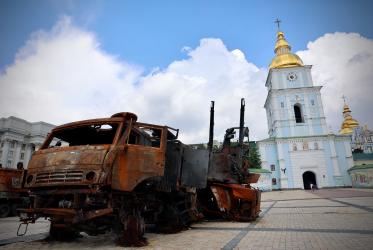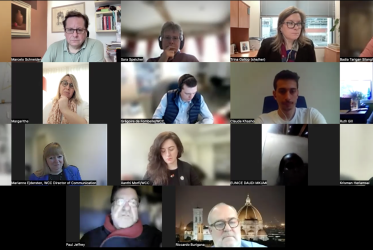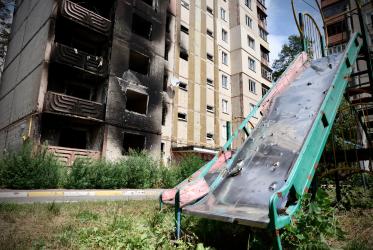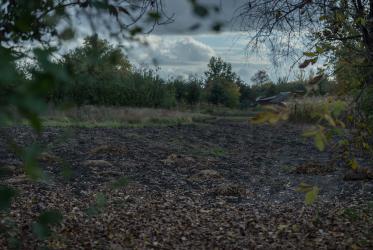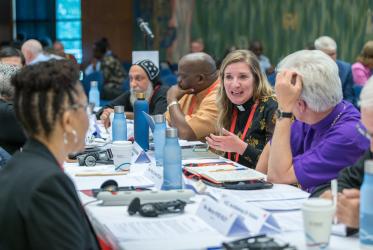Dear brothers and sisters in Christ,
Thank you for inviting our delegation. Last weeks the leadership of the World Council of Churches took considerable efforts to make our being here possible. One of the reasons is the war in Ukraine that makes our possibility for journeys strictly restricted.
I am greeting you on behalf of the Ukrainian Orthodox Church. According to the official state statistics this is the largest Church of Ukraine with over 12 thousand priests and parishes. I would also say it is the historical and traditional Church of Ukraine which has its history since over one thousand years.
I came to this meeting from Ukraine, a country in which the geographical centre of Europe is located. Nevertheless, our country traditionally belongs to Eastern Europe. And some speak of it as “the country of the former Soviet Union”. This issue is confusing and is determined by the prospect with which one looks at Ukraine.
Position of Ukraine is determined by its size, its history, and the interweaving of its relations with Russia. The latter is the reason that till now our Church has not been directly represented in the World Council of Churches. The reason is in some difficulties in inter-Orthodox communication. After all, while carrying on its ministry in the independent state of Ukraine, our Church formally was presented at such forums as a part of the Russian Church.
However, for more than six months Ukraine exists in the situation of the war. This is a war in which our enemies are trying to make us part of Russia again. The idea of imperial greatness and a glorious past caused the death of many thousands of Ukrainians, and the destruction of many cities. Over the past six months, millions of Ukrainians have been forced to leave their country. Many of them found refuge in Germany.
The war became an important factor not only in the fate of individuals, but also for our Church in its search for a new status. On May 27, only three months ago, our Church’s leadership assembled a council with participation of the episcopate, priests, monks and laity. At this council the overwhelming majority of participants spoke in favour of complete independence from the Moscow Patriarchate and for self-governance of our Church.
Undoubtedly it is result of the on-going war in Ukraine. But for me it is first of all result of the development of our Church since 1990 when our Church received a Blessing Letter from the Patriarch Alexiy of Moscow on the rights of wide autonomy in its functioning in Ukraine.
The mentioned decision of the Council of our Church still needs time and efforts for reception from the side of our faithful, so that our people remain consolidated around our Church hierarchy. There were and remain many critical voices inside Ukraine who accuse our Church of being too close to the Church of Russia. Our Church exists in the situation when its activity is sharply criticized not only from abroad but from other orthodox structures inside the country.
Nowadays our Church has very actual goal – to help our people in the situation of the humanitarian crisis and large need. Many structures and faithful of our Church became volunteers that support people in need. It is an answer on the urgent request through our circumstances. Our Church receives and distributes different kinds of humanitarian help – especially from the neighbour countries and from our sister-Churches.
I am the head of the charitable foundation “Academic initiative” and can mention its activity as an example of reorientation. Before the war our goals were to support international exchange in the sphere of theological education and to inform international partners on the Church situation in Ukraine. But after the beginning of the war we concentrated ourselves on the additional activity. We received many donations from different Christian organizations. Through these donations we were able to help more than 2,5 thousand people in need from the regions affected by the war.
I hope that once this war will be over. Then our Church will be able to open up more for communication with other Christians – both in Ukraine and around the world. It will include our membership in the World Council of Churches. Personally, I made significant efforts to this and I am making them further.
Among the examples of my efforts are preparation of a conference on the reconciliation of Christian Churches in Ukraine, financing textbooks on other Christian confessions, support of student exchange. Our students improve their theological knowledge in different countries of Europe, including the Ecumenical Institute at the WCC in Bossey. And this is gradually changing the climate within our Church, making it more open and ecumenical.
So, I am an optimist. I hope we can decide the urgent questions and build long-term constructive relationships with other Christian Churches and organizations. Thank you very much for your attention!
